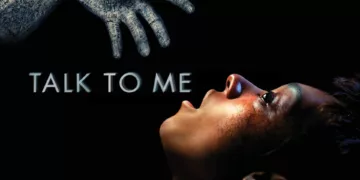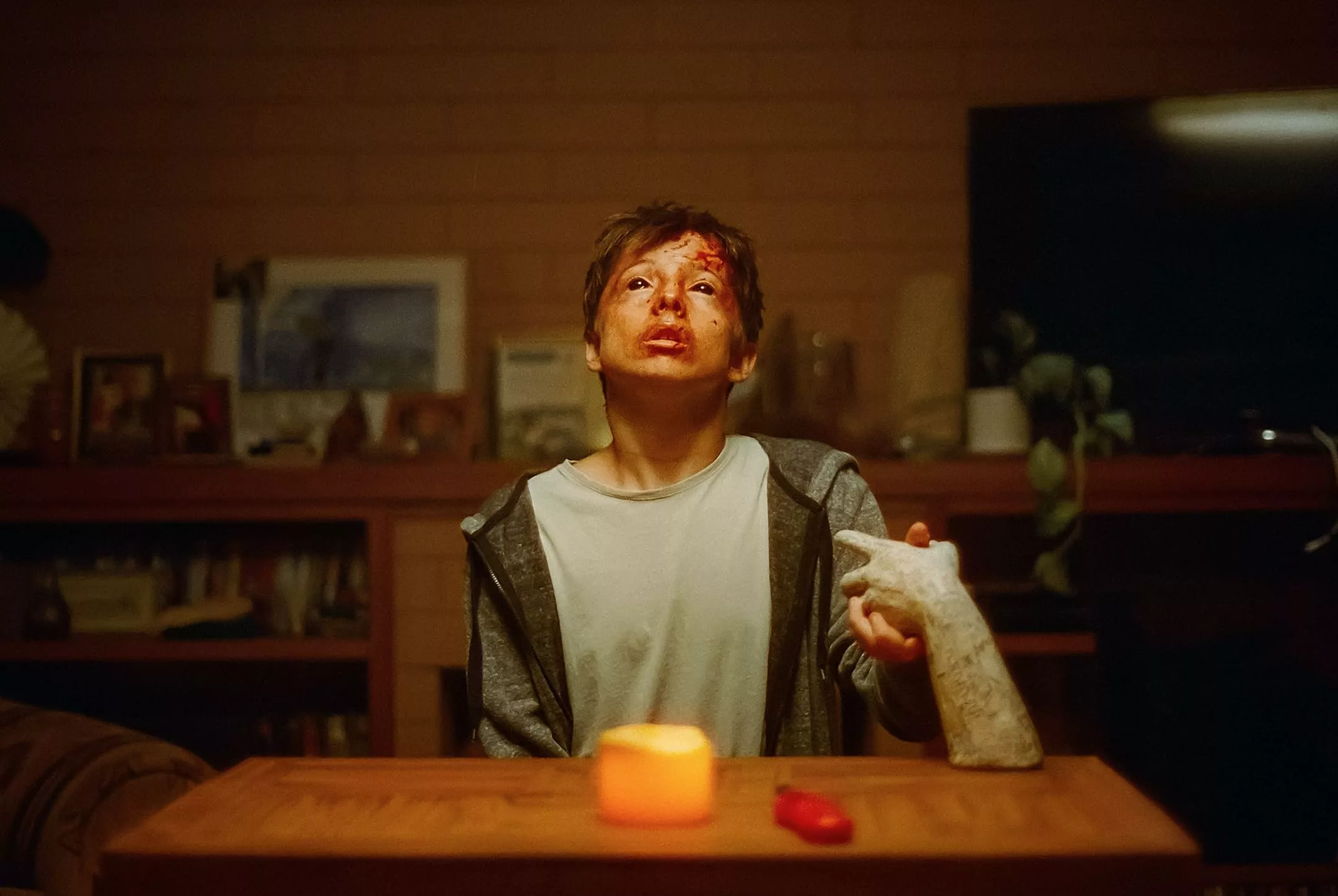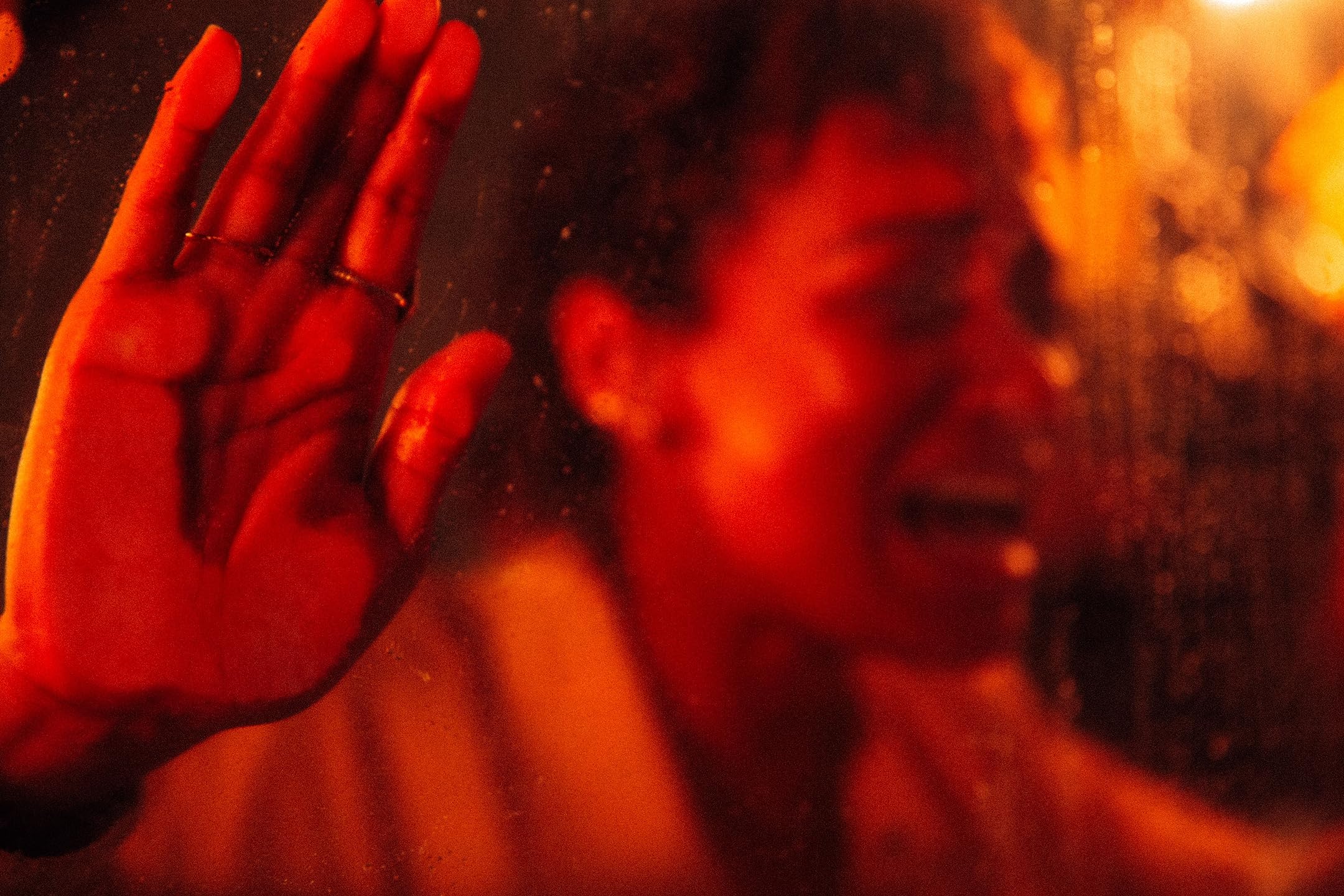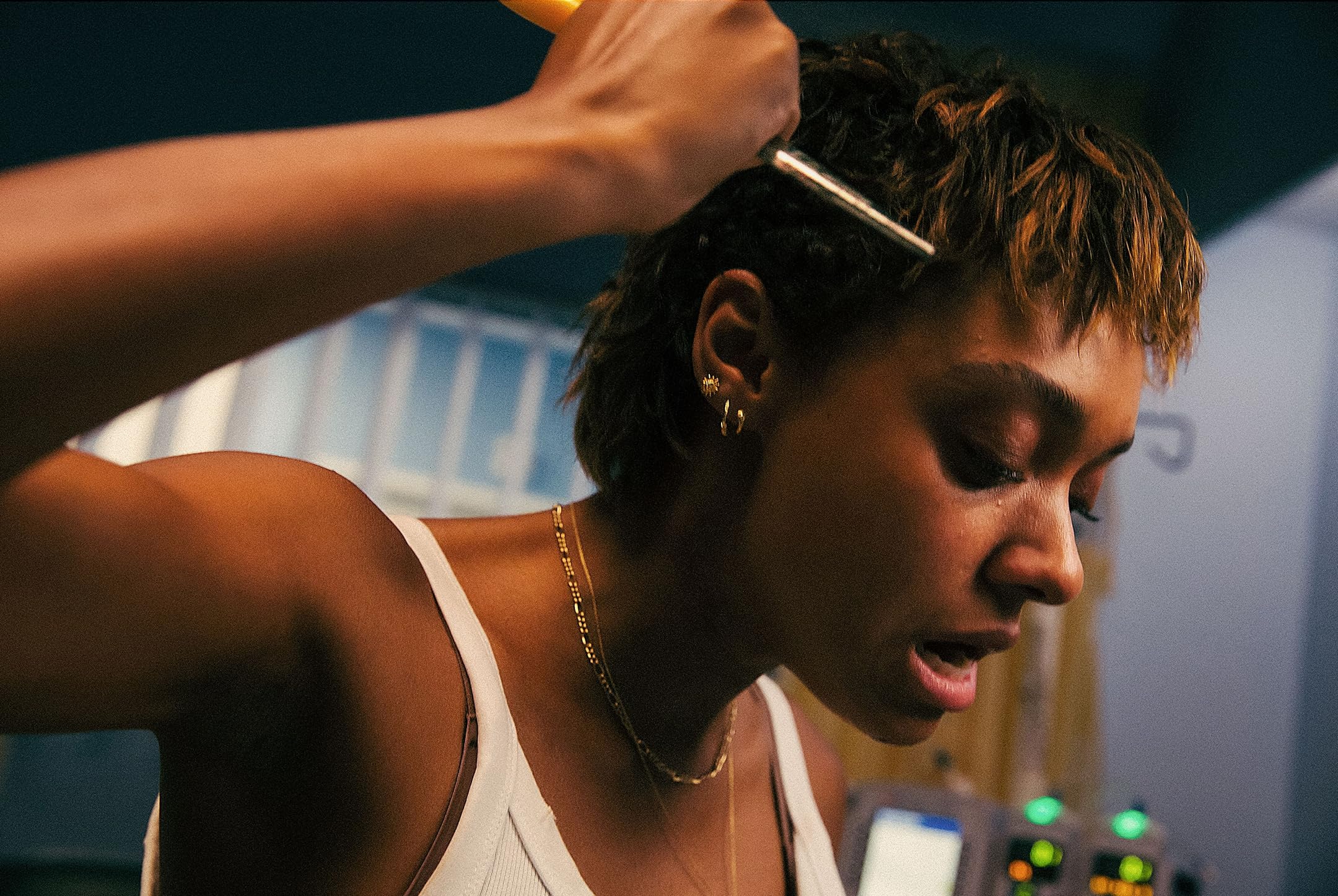“Talk to Me” is a chilling modern gothic tale that probes the depths of grief, technological obsession, and our morbid fascination with the supernatural. At its core, this haunting film from directors Danny and Michael Philippou envisions a terrifying craze sweeping through the youth – a sinister rite involving a graven ceramic hand that allows its holders to briefly channel malicious spirits from the great beyond.
What sets this horror apart is its deft interweaving of visceral frights with poignant social commentary on the perils of digital oversharing and fame-seeking. The Philippou brothers, whose YouTube channel RackaRacka amassed a cult following with chaotic action vignettes, have pivoted towards an artful exploration of how modern adolescents navigate loss and peer pressure in an age of viral media.
Beneath its chilling depictions of demonic possession lies a profound rumination on the human psyche’s vulnerability when consumed by unresolved trauma and the insatiable desire for shock value. “Talk to Me” is a spine-tingling allegory that peers into the abyss of today’s youth, capturing both their resilience and their susceptibility to darkness when unmoored from meaningful anchors.
The Haunted Hand’s Accursed Allure
At the torrid heart of “Talk to Me” lies a peculiar artifact – a severed hand, embalmed and encased in ceramic, that bears the power to bridge the realms of the living and the dead. This macabre relic finds its way into the hands of Mia, a teenager still reeling from her mother’s tragic suicide. Alongside her friends Jade, Riley, and others, Mia is drawn into a dangerous occult ritual involving the haunted hand.
By uttering the incantation “Talk to Me”, they can briefly glimpse the world of the departed. But to truly experience a full-bodied possession, one must brazenly declare “I let you in” – an act that allows malevolent spirits to seize control of their corporeal vessels for a fleeting 90 seconds. What begins as a morbid curiosity soon escalates into an obsession, as the teens recklessly chase the adrenaline rush of communing with the undead, heedless of the grave perils.
For Mia, this metaphysical game takes on a deeply personal dimension as she desperately seeks to reconnect with her late mother’s spirit. However, the lines between the realm of the living and the restless dead become increasingly blurred, unleashing a maelstrom of horrific consequences. As the rules governing the use of the accursed hand are violated, a nightmarish reckoning awaits all those who have dared to pierce the veil separating our world from the great beyond.
A Masterful Transition to the Silver Screen
“Talk to Me” marks an auspicious debut for the Philippou brothers, Danny and Michael, as they make a seamless transition from their online viral antics to the realm of big-screen storytelling. With a deft hand, these twin auteurs have interwoven haunting supernatural thrills with a profound emotional core, deftly balancing fright and philosophical substance.
From its unsettling opening tracking shot through a pulsating party, the film’s visual language immediately establishes a mood of dread and unease. The camerawork of Aaron McLisky is nothing short of sublime, with judicious use of handheld techniques amplifying the visceral horror. The makeup and visual effects teams have conjured a nightmarish gallery of ghoulish apparitions that will sear themselves into the viewer’s psyche.
Yet amidst the terrors, the Philippous demonstrate a keen understanding of the cadence of humor and lighter moments that provide a welcomed counterpoint to the darkness. They are masters of tonal modulation, effortlessly pivoting from scenes of raucous teenage revelry to gut-wrenching sequences that will leave even the stout-hearted breathless with dread.
Ultimately, it is the film’s emotional depth that cements its status as more than mere shockfest. At its core beats the anguished heart of Mia, brilliantly embodied by Sophie Wilde in a tour-de-force performance. The Philippous exploit supernatural horror as a profound allegory for the turmoil of grief, crafting a searing portrait of a young woman’s anguished journey to reconnect with her late mother’s spirit.
With “Talk to Me”, the Philippou brothers have announced their arrival as cinematic forces to be reckoned with, deftly navigating the treacherous tides of genre while crafting a rich, thematically resonant tale that burrows deep under the skin and into the psyche.
Unvarnished Portraits of Turbulent Youth
At the bleeding heart of “Talk to Me” is a searing performance by newcomer Sophie Wilde that will be seared into the annals of great horror protagonists. As Mia, the tormented young woman haunted by her mother’s suicide, Wilde imbues the role with profound depths of vulnerability and anguish. She is the linchpin that elevates the film from mere fright-fest to a searing meditation on grief’s desolate landscape.
But Wilde is not alone in her excellence. The Philippou brothers have assembled an ensemble of tremendous talent and remarkable naturalism in portraying the tumult of adolescence. Alexandra Jensen as Jade, Mia’s bestie turned reluctant partner in occult misadventures, is a particular standout. Her arc charts the treacherous terrain of modern teenage friendships with disarming authenticity.
The rest of the youthful cast, including Joe Bird as the hapless Riley and Otis Dhanji as Jade’s pious boyfriend Daniel, imbue their roles with remarkable depth. These are not mere horror movie victims, but richly drawn characters that blur the boundaries between glossy Hollywood portrayals and the adolescents we encounter in our everyday realities.
Grounding the narrative is the masterful Miranda Otto as the perpetually exasperated mother Sue. A scene-stealing font of acerbic wit, Otto’s performance is a masterclass in understated comedic timing that provides a deft contrapuntal balance to the film’s more harrowing moments.
It is this phenomenal ensemble, deftly directed by the Philippou duo, that elevates “Talk to Me” from mere genre exercise into something far more transcendent – a penetrating human drama cloaked in the garb of supernatural horror. Their collective authenticity is a haunting reminder that the true terrors lie not in the realm of the undead, but within the frightening realities of life itself.
A Searing Reflection of Our Digital Ennui
Beneath its flesh-crawling visuals and sonorous scares, “Talk to Me” operates as a searing philosophical critique of modern society’s obsession with digital spectacle and the insidious allure of viral fame. The cursed hand that catalyzes the film’s horrific events is, at its core, a supremely cynical metaphor for the siren song of internet notoriety taken to its ghastly extreme.
With chilling perspicacity, the Philippou brothers lay bare the spiritual malaise that afflicts today’s youth – a pervasive sense of ennui and emotional disconnection that renders them vulnerable to increasingly perilous pursuits of transcendence, no matter how ephemeral or self-destructive. The teens’ reckless dance with the supernatural realms is but a twisted reflection of their unslakable thirst for shock value and public validation in our hyper-connected yet profoundly isolating digital age.
At the molten core of this apocalyptic allegory rests a profound meditation on grief’s scouring anguish and the perils of attempting to breach the veil separating the living from the unmapped territories of the dead. Mia’s feverish quest to reconnect with her late mother’s spirit serves as a visceral embodiment of mourning’s torturous labyrinths – a purgatorial maze that, if navigated without care, can only culminate in utter annihilation of self.
Yet within this maelstrom of terrestrial and metaphysical horrors blossoms a poignant coming-of-age saga that lays bare the turbulence of transitioning from adolescence into the stark terrain of adulthood. The ecstasies and agonies experienced by Mia and her cohorts are the birthpangs of an uncertain future, searing reminders that we must slay the demons of our past to emerge, battered but unbroken, into the promise of a new day.
“Talk to Me” is a cinematic liturgy for our times – a haunting revelry that peels away the comforting facade of the digital masquerade to confront us with the existential terrors lurking beneath. It is as pitiless as it is profound, a tour de force of philosophical horror that will burrow deep into your marrow.
An Indelible Stamp on the Horror Canvas
In the annals of supernatural horror, “Talk to Me” shall be remembered as a masterwork – an audacious amalgam of skin-crawling frights, emotional devastation, and profound social commentary unspooling like some unholy revelry.
The Philippou brothers have crafted a narrative of spellbinding depth and complexity, deftly navigating the treacherous tonal shifts between feverish teen antics and the cosmic abyss of unresolved grief. While its climactic descent into chaotic mayhem may lack some narrative finesse, this remains a stunningly assured piece of cinema that heralds the arrival of two genuine auteurs.
As both a terrifying supernatural chiller and searing philosophical tract on the perils of our digital obsessions, “Talk to Me” leaves an indelible mark. Each frame crackles with an intensity and thematic richness seldom seen in the contemporary horror landscape.
Whether this haunting tale spawns a franchise or stands alone as a singularly compelling artistic statement, one truth is inescapable – the Philippous have irrevocably altered the genre’s trajectory. Their emergence into feature filmmaking portends an emboldened new era of smart, subversive horror as conceptually daring as it is viscerally unsettling. For those brave enough to peer into the abyss, “Talk to Me” proffers an experience as astonishing as it is unforgettable.
The Review
Talk to Me
"Talk to Me" is a superlative descent into psychological and supernatural horror that establishes the Philippou brothers as masterly new voices in genre filmmaking. Audacious in its conceptual ambitions yet profoundly resonant in its emotional truth, it is both a chilling fright fest and a penetrating sociological mirror, reflected through the prism of adolescent turmoil. With a surfeit of shuddersome delights and philosophical substance alike, this haunting cinematic liturgy etches itself upon the psyche through sheer visceral force. A modern masterwork of dread-inducing power.
PROS
- Brilliantly chilling and suspenseful horror premise
- Strong social commentary on social media and youth culture
- Impressive directorial debut for the Philippou brothers
- Stellar performances, especially Sophie Wilde as Mia
- Effective blend of horror, humor, and emotional depth
- Haunting visuals and atmospheric cinematography
- Thought-provoking exploration of grief, loss, and the supernatural
CONS
- Climax could have been tighter and more polished narratively
- Some character motivations/arcs not fully fleshed out
- Commentary on internet fame felt a bit underexplored at times
- Ending leaves some plot threads unresolved (potential setup for a sequel)




















































